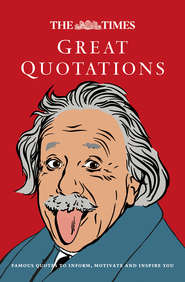скачать книгу бесплатно
An Essay Concerning Human Understanding (1689)
John Locke, English philosopher (1632–1704)
•
Word is but wynd; leff woord and tak the dede.
Secrets of Old Philosophers
John Lydgate, English poet (1370–1451)
•
The highest reward for a man’s toil is not what he gets for it but what he becomes by it.
John Ruskin, English art critic (1819–1900)
•
Action is consolatory. It is the enemy of thought and the friend of flattering illusions.
Nostromo (1904)
Joseph Conrad, Polish-British writer (1857–1924)
•
Iron rusts from disuse, stagnant water loses its purity, and in cold weather becomes frozen; even so does inaction sap the vigour of the mind.
The Notebooks of Leonardo da Vinci (1883)
Leonardo da Vinci, Italian polymath (1452–1519)
•
Everybody, sooner or later, sits down to a banquet of consequences.
Old Mortality (1884)
Robert Louis Stevenson, Scottish writer (1850–1894)
•
The only infallible rule we know is, that the man who is always talking about being a gentleman never is one.
Ask Mamma (1858)
RS Surtees, English editor and sporting writer (1805–1864)
•
Everyone is more or less mad on one point.
Plain Tales from the Hills (1888)
Rudyard Kipling, English journalist and writer (1865–1936)
•
The ordinary acts we practise every day at home are of more importance to the soul than their simplicity might suggest.
Sir Thomas More, English saint and lawyer (1478–1535)
•
Terror … often arises from a pervasive sense of disestablishment; that things are in the unmaking.
Danse Macabre (1981)
Stephen King, American writer (1947–)
•
Perfection is terrible, it cannot have children.
The Munich Mannequins (1965)
Sylvia Plath, American poet and writer (1932–1963)
•
It is part of human nature to hate the man you have hurt.
Agricola (c. 98)
Tacitus, Roman senator and historian (c. 56–120)
•
Considering how foolishly people act and how pleasantly they prattle, perhaps it would be better for the world if they talked more and did less.
A Writer’s Notebook (1946)
W Somerset Maugham, British playwright (1874–1965)
•
It is an undoubted truth, that the less one has to do, the less time one finds to do it in. One yawns, one procrastinates, one can do it when one will, and therefore one seldom does it at all.
Lord Chesterfield, British statesman (1694–1773)
•
Anything that is worth doing has been done frequently. Things hitherto undone should be given, I suspect, a wide berth.
Mainly on the Air (1946)
Sir Max Beerbohm, English essayist and parodist (1872–1956)
•
Truly, when the day of judgment comes, it will not be a question of what we have read, but what we have done.
De Imitatione Christi (c. 1418–1427)
Thomas а Kempis, Dutch-German canon regular and writer (1380–1471)
•
Men are rewarded and punished not for what they do, but rather for how their acts are defined. This is why men are more interested in better justifying themselves than in better behaving themselves.
The Second Sin (1973)
Thomas Szasz, American-Hungarian psychiatrist (1920–2012)
ADVICE AND PRINCIPLES (#ulink_764c27b7-74f3-5d53-ba8d-5719e086b897)
Out of clutter, find simplicity.
Albert Einstein, German theoretical physicist (1879–1955)
•
There’s only one corner of the universe you can be certain of improving, and that’s your own self.
Time Must Have a Stop (1944)
Aldous Huxley, English writer and philosopher (1894–1963)
•
Start where you are. Use what you have. Do what you can.
Arthur Ashe, American tennis player and Aids activist (1943–1993)
•
If you would be known, and not know, vegetate in a village; if you would know, and not be known, live in a city.
Lacon (1820)
Charles Caleb Colton, English cleric (1780–1832)
•
Reflect upon your present blessings, of which every man has many; not on your past misfortunes of which all men have some.
Charles Dickens, English writer and social critic (1812–1870)
•
Never make a defence or apology before you be accused.
Charles I, King of England (1600–1649)
•
When environment changes, there must be a corresponding change in life.
The Wartime Journals (1970)
Charles Lindbergh, American aviator (1902–1974)
•
Get the advice of everybody whose advice is worth having — they are very few — and then do what you think best yourself.
Charles Stewart Parnell, Irish nationalist leader (1846–1891)
•
A ruffled mind makes a restless pillow.
Charlotte Bront?, English writer (1816–1855)
•
If you have a garden and a library, you have everything you need.
Ad Familiares IX, 4
Cicero, Roman statesman (106–43 BC)
•
Stand a little less between me and the sun.
[On being asked by Alexander the Great what he could do for him]
